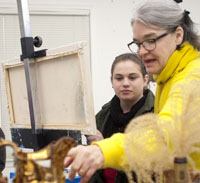Get More From Your DAF
Ensure you’ve made the most of your donor advised fund—for your family and for the College. Download the FREE guide Maximize the Impact of Donor Advised Funds.
View My GuideA donor advised fund (DAF), which is like a charitable savings account, gives you the flexibility to recommend how much and how often money is granted to Randolph College and other qualified charities. You can recommend a grant or recurring grants now to make an immediate impact or use your fund as a tool for future charitable gifts.
You can also create a lasting legacy by naming Randolph College the beneficiary of the entire account or a percentage of the fund. With a percentage, you can create a family legacy of giving by naming your loved ones as your successor to continue recommending grants to charitable organizations. Contact your fund administrator for a beneficiary form.
DAF Basics
Still learning about DAFs? Discover the ease of opening a donor advised fund—plus the advantages you’ll enjoy—with your FREE guide One Stop Giving: The Convenience and Simplicity of Donor Advised Funds.
Check Out This Potential Scenario
Check Out This Potential Scenario
Learn How to Fund It
Create a donor advised fund with one of the following assets:
Information contained herein was accurate at the time of posting. The information on this website is not intended as legal or tax advice. For such advice, please consult an attorney or tax advisor. Figures cited in any examples are for illustrative purposes only. References to tax rates include federal taxes only and are subject to change. State law may further impact your individual results. California residents: Annuities are subject to regulation by the State of California. Payments under such agreements, however, are not protected or otherwise guaranteed by any government agency or the California Life and Health Insurance Guarantee Association. Oklahoma residents: A charitable gift annuity is not regulated by the Oklahoma Insurance Department and is not protected by a guaranty association affiliated with the Oklahoma Insurance Department. South Dakota residents: Charitable gift annuities are not regulated by and are not under the jurisdiction of the South Dakota Division of Insurance.
 Joe and Laura want to give back to their hometown by putting their money where it will do the most good. They establish a $25,000 donor advised fund with a community foundation. The couple receives a federal income tax charitable deduction for the amount of the gift. They also get all the time they need to decide which charities to support. After researching community needs with the foundation's staff, Joe and Laura recommend grants for the College (which they've supported for years) and the Animal Rescue League. The foundation presents the charities with checks from the Megan Fund, which Joe and Laura named in honor of their granddaughter. Joe and Laura are delighted to start this personal legacy of giving.
Joe and Laura want to give back to their hometown by putting their money where it will do the most good. They establish a $25,000 donor advised fund with a community foundation. The couple receives a federal income tax charitable deduction for the amount of the gift. They also get all the time they need to decide which charities to support. After researching community needs with the foundation's staff, Joe and Laura recommend grants for the College (which they've supported for years) and the Animal Rescue League. The foundation presents the charities with checks from the Megan Fund, which Joe and Laura named in honor of their granddaughter. Joe and Laura are delighted to start this personal legacy of giving.
